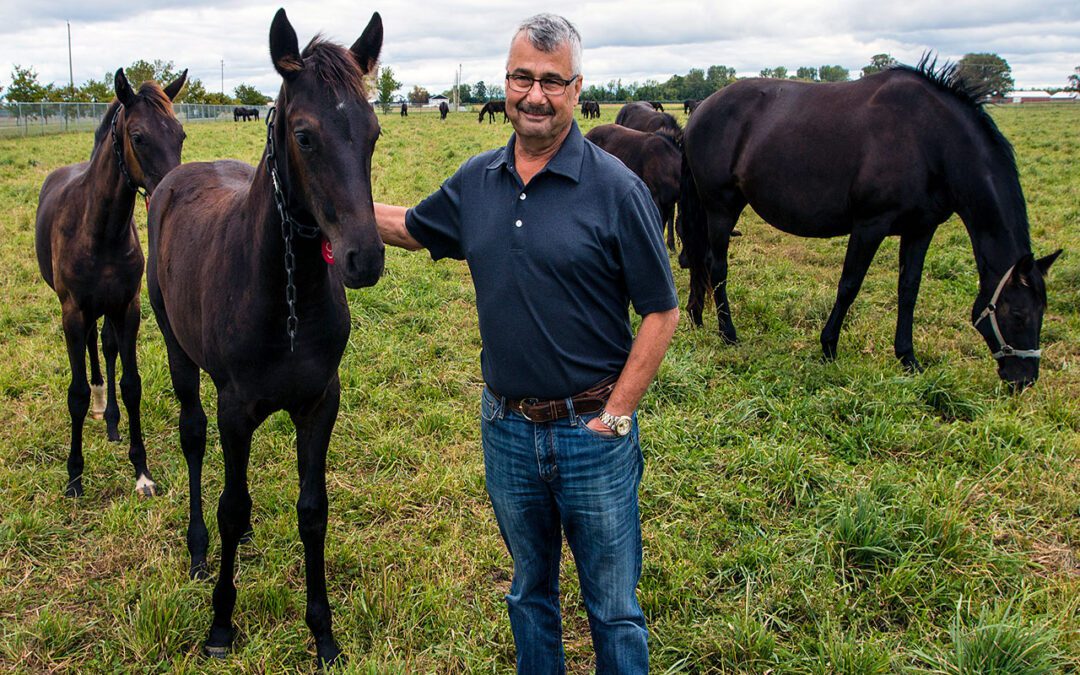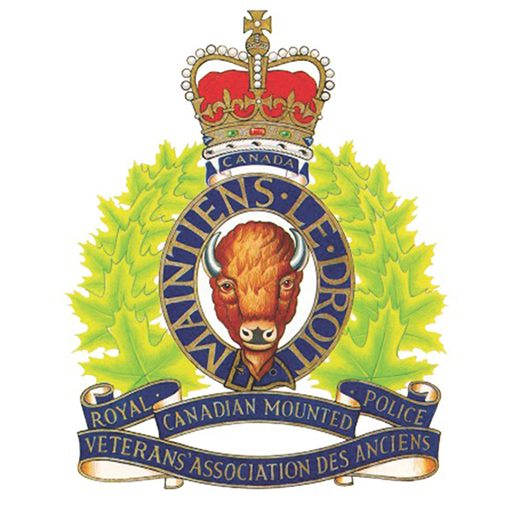Moving on to Greener Pastures
The horse breeder for the RCMP Musical Ride retires after 40 years.
By Tanya Baglole
The clip clop of horse’s hooves on the concrete stable floor rings in the background. Outside, yearlings munch on hay in a sprawling pasture that is part of the 366-acre farm which is home to Pakenham Remount Detachment, the birthplace of the iconic black horses used in the RCMP Musical Ride. After 40 years, the man who is responsible for breeding these horses, and managing the farm, John Phillips, is set to retire a day after Canada’s 150th anniversary celebrations on July 1.
Phillips, 65, joined the RCMP as a stable hand in 1976, mucking stalls, feeding horses, and turning them out at the Musical Ride Centre in Ottawa. In 2001, he became farm manager at the Pakenham facility, plowing and rotating hay crops to feed the 85 horses, purchasing equipment and supplies, and overseeing six employees and five contract workers.
The RCMP sent Phillips to Colorado State University in 1995 to study in the school’s equine program, where he learned about genetics, breeding and artificial insemination. He’s also taken courses in Alberta and Texas to keep abreast of the industry. After relying on the veterinarians for the first two years as farm manager, Phillips took the reins of the RCMP horse breeding program. He has since increased the success of the artificial insemination program to 90% from 50% previously.
Phillips has an extensive understanding of horse breeding, including the European bloodlines (Hanoverian), that produce the Musical Ride horses. Work horses and carriage horses were bred to thoroughbred stallions, which are hot blooded and normally used as race horses, to produce warm blooded horses, whose offspring are of medium size, good temperament and character. The Hanoverian horses are the biggest breed of warm bloods in the world, and Germany produces 6,000 foals a year. Phillips travels to Europe to find the best horses to sustain the RCMP horse breeding program.
All mares at the Pakenham farm are bred by artificial insemination, and Phillips does about 300 ultrasounds per year on impregnated mares, starting 10 days after gestation to track the embryos. One stallion named Dubai has produced about 95 horses.

C/M John Phillips with the foal Edward, at a viewing of the RCMP Musical Ride Centre in Ottawa. The four-month old foal was named after Prince Edward, who was coming to the Nation’s Capital as part of a Royal Tour.
At the Pakenham farm, where you can hear the Waba Creek gushing by, and the stables are spotless, a herd of 20 mares are bred each year. The goal is to produce 20 foals annually, with the hope to send 10 three-year-olds to Ottawa for training, and of those, about six make the Musical Ride. The rest of the horses are auctioned off every two years.
“I can pretty well tell you within three weeks of birth whether that foal is suitable for the Ride. When I go to the stall and open the stall door, the foal that comes to me and is curious and wants to know what is going on is basically the character we are looking for – bold and interested,” said John Phillips.
“The higher strung foals are better suited for competition, rather than the Musical Ride,” he explained. “Shy horses can go either way, but if treated correctly, they turn around and become great ride horses also.”
Two-thirds of the horses on the Ride were produced through the efforts of John Phillips at the Pakenham farm. They are black in colour, about 1,200 pounds, 16-17 hands in height, and start performing with the Musical Ride at six years of age.


Staff sweep the stables and horses are in their stalls at the Pakenham Remount Detachment. Photos by RCMP-GRC
“In my day, stallions were very aggressive and you needed a special handler. With the warm bloods, the stallions are so good natured, they will put their head in your lap. That is exactly what we need for the Ride,” explained Phillips.
Musical Ride horses have an extensive itinerary, travelling across Canada and internationally, and must handle huge crowds with cameras. Many people don’t realize a lot of the RCMP members have little knowledge of horses before coming to the Musical Ride program, and how quickly they start showing in public with 20,000 people in the audience.
I think the Musical Ride doesn’t only speak to Canadians. You can travel anywhere in the world and the Ride is what they know of Canada.
“It’s pretty amazing. It shows you the character of the horse and the willingness to do his job. With the warm bloods, we’ve gone to a very normal character, good ride-ability and willingness to work,” explains Phillips.
“John Phillips will be dearly missed by the Musical Ride and everyone who has had the pleasure to work with him. In both the domestic and international arena, the horses produced through our breeding program are adored. John has left an incredible legacy to the Musical Ride, the RCMP and Canada,” said Insp. Patrick Egan, Officer in Charge, RCMP Musical Ride.
The busiest time at the farm is from April to July, when the mares are giving birth after an 11-month gestation, and breeding begins anew. Work happens 24-7, and the quiet months are during the winter, when Phillips rides his own horses, gives riding lessons, or leaves his home in White Lake, Ont., to compete in equestrian events across North America.
One of the career highlights for Phillips, who grew up on a dairy farm near Carlsbad Springs, was meeting the Queen at Windsor Castle in 2015. He presented her with a pamphlet of a chestnut horse whose mother was Golden Jubilee, whom the Queen had donated to the RCMP years earlier. The chestnut became reserve champion at the Royal Agriculture Winter Fair in Toronto.
When asked what he’ll miss most after retiring this summer, Phillips, with a twinkle in his eye and a chuckle, said, “Not the paperwork. But the foaling, watching the horses grow, the trips to look at possible breeding stallions, purchasing horses – those are beautiful trips. When we go to Europe, we get to see the best of the best.”
And the impact he’s had on the evolution of the breed, and to produce better Musical Ride horses has been very successful, with the proceeds of the bi-annual auctions funding the purchase of horses for the breeding program.
“There is something about an animal that will attract people that don’t have any connections with that horse whatsoever but there is a love affair to watch them move and watch them do their thing.”
Read More
Discover the great stories of the RCMP from across Canada and beyond our borders. The Quarterly offers insightful features, photographs and graphics on the rich history of the RCMP. Enjoy reading one article from each issue of the magazine on the RCMP Veterans’ Association website.
The Quarterly is published four times a year in English and in French. Subscribe today by calling toll free at 1-877-215-3469. Consider a gift subscription to a cadet, family member or friend.


